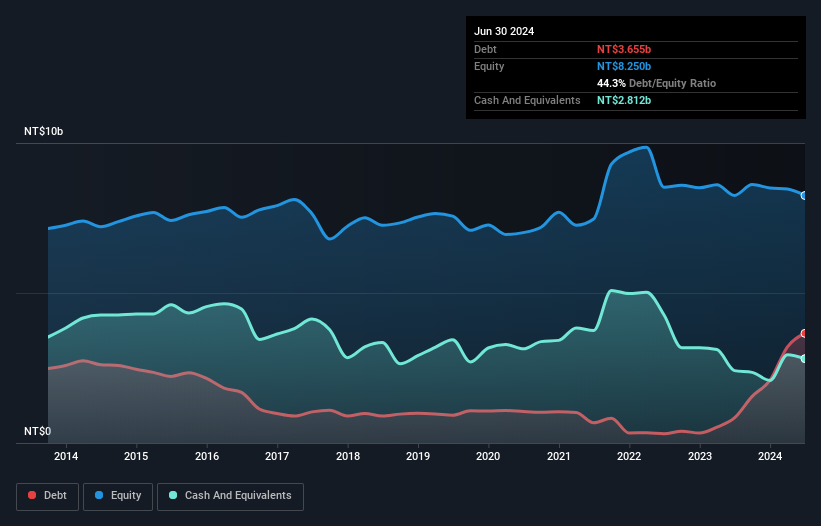- Taiwan
- /
- Semiconductors
- /
- TWSE:2340
Here's Why Taiwan-Asia Semiconductor (TWSE:2340) Can Afford Some Debt

Legendary fund manager Li Lu (who Charlie Munger backed) once said, 'The biggest investment risk is not the volatility of prices, but whether you will suffer a permanent loss of capital.' So it might be obvious that you need to consider debt, when you think about how risky any given stock is, because too much debt can sink a company. We can see that Taiwan-Asia Semiconductor Corporation (TWSE:2340) does use debt in its business. But the more important question is: how much risk is that debt creating?
What Risk Does Debt Bring?
Debt and other liabilities become risky for a business when it cannot easily fulfill those obligations, either with free cash flow or by raising capital at an attractive price. Part and parcel of capitalism is the process of 'creative destruction' where failed businesses are mercilessly liquidated by their bankers. However, a more common (but still painful) scenario is that it has to raise new equity capital at a low price, thus permanently diluting shareholders. By replacing dilution, though, debt can be an extremely good tool for businesses that need capital to invest in growth at high rates of return. The first step when considering a company's debt levels is to consider its cash and debt together.
See our latest analysis for Taiwan-Asia Semiconductor
What Is Taiwan-Asia Semiconductor's Debt?
You can click the graphic below for the historical numbers, but it shows that as of June 2024 Taiwan-Asia Semiconductor had NT$3.66b of debt, an increase on NT$833.8m, over one year. On the flip side, it has NT$2.81b in cash leading to net debt of about NT$842.9m.

How Strong Is Taiwan-Asia Semiconductor's Balance Sheet?
We can see from the most recent balance sheet that Taiwan-Asia Semiconductor had liabilities of NT$2.24b falling due within a year, and liabilities of NT$3.51b due beyond that. On the other hand, it had cash of NT$2.81b and NT$1.17b worth of receivables due within a year. So its liabilities outweigh the sum of its cash and (near-term) receivables by NT$1.76b.
Since publicly traded Taiwan-Asia Semiconductor shares are worth a total of NT$14.9b, it seems unlikely that this level of liabilities would be a major threat. However, we do think it is worth keeping an eye on its balance sheet strength, as it may change over time. When analysing debt levels, the balance sheet is the obvious place to start. But you can't view debt in total isolation; since Taiwan-Asia Semiconductor will need earnings to service that debt. So if you're keen to discover more about its earnings, it might be worth checking out this graph of its long term earnings trend.
Over 12 months, Taiwan-Asia Semiconductor reported revenue of NT$4.2b, which is a gain of 11%, although it did not report any earnings before interest and tax. That rate of growth is a bit slow for our taste, but it takes all types to make a world.
Caveat Emptor
Over the last twelve months Taiwan-Asia Semiconductor produced an earnings before interest and tax (EBIT) loss. Indeed, it lost NT$123m at the EBIT level. When we look at that and recall the liabilities on its balance sheet, relative to cash, it seems unwise to us for the company to have any debt. Quite frankly we think the balance sheet is far from match-fit, although it could be improved with time. Another cause for caution is that is bled NT$2.5b in negative free cash flow over the last twelve months. So in short it's a really risky stock. There's no doubt that we learn most about debt from the balance sheet. However, not all investment risk resides within the balance sheet - far from it. These risks can be hard to spot. Every company has them, and we've spotted 3 warning signs for Taiwan-Asia Semiconductor (of which 2 are a bit concerning!) you should know about.
At the end of the day, it's often better to focus on companies that are free from net debt. You can access our special list of such companies (all with a track record of profit growth). It's free.
If you're looking to trade Taiwan-Asia Semiconductor, open an account with the lowest-cost platform trusted by professionals, Interactive Brokers.
With clients in over 200 countries and territories, and access to 160 markets, IBKR lets you trade stocks, options, futures, forex, bonds and funds from a single integrated account.
Enjoy no hidden fees, no account minimums, and FX conversion rates as low as 0.03%, far better than what most brokers offer.
Sponsored ContentValuation is complex, but we're here to simplify it.
Discover if Taiwan-Asia Semiconductor might be undervalued or overvalued with our detailed analysis, featuring fair value estimates, potential risks, dividends, insider trades, and its financial condition.
Access Free AnalysisHave feedback on this article? Concerned about the content? Get in touch with us directly. Alternatively, email editorial-team (at) simplywallst.com.
This article by Simply Wall St is general in nature. We provide commentary based on historical data and analyst forecasts only using an unbiased methodology and our articles are not intended to be financial advice. It does not constitute a recommendation to buy or sell any stock, and does not take account of your objectives, or your financial situation. We aim to bring you long-term focused analysis driven by fundamental data. Note that our analysis may not factor in the latest price-sensitive company announcements or qualitative material. Simply Wall St has no position in any stocks mentioned.
About TWSE:2340
Taiwan-Asia Semiconductor
Engages in the manufacture and sale of semiconductor components in Taiwan and internationally.
Mediocre balance sheet and slightly overvalued.
Similar Companies
Market Insights
Community Narratives



